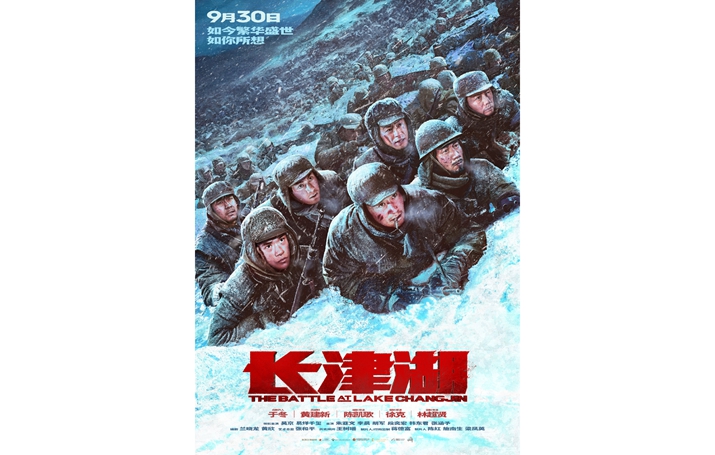| Top 10 Business News Stories |
| Box-Office Champion | |
| In recent years, patriotic-inspired films have explored historical and cultural resources, especially the red cultural ones, to enrich their imagery, portrayals and overall genre | |
|
|
 A poster of the movie The Battle at Lake Changjin (FILE)
When the word "battle," or any other war-affiliated term, pops up in a movie title, you're usually in for an action-packed, loud, at times cruel, but ever-grand spectacle: Dunkirk, Pearl Harbor, Hacksaw Ridge, Enemy at the Gates. Yet there's more to it than meets the eye. Three prestigious directors-Chen Kaige, Hark Tsui and Dante Lam-are behind the 176-minute-long war epic The Battle at Lake Changjin, shot with the help of an unprecedented 70,000 extras and China's largest-ever production budget of $200 million, that follows the Chinese People's Volunteers (CPV) who joined the battle at Lake Changjin, or Chosin Reservoir, in the northeast of the Korean Peninsula during the War to Resist U.S. Aggression and Aid Korea (1950-53). With total revenue reaching 5.3 billion yuan ($830 million) as of October 26, the film has made it into the world's box office top two this year. Estimates from Chinese ticketing platform Maoyan indicate the movie will end up making a total of more than 5.4 billion yuan ($846 million). If this assessment proves correct, the film will beat box-office sensation Hi, Mom to become the highest-grossing movie of 2021 in China. In recent years, patriotic-inspired films have explored historical and cultural resources, especially the red cultural ones, to enrich their imagery, portrayals and overall genre. From multiple angles and with diversification in production, these films show more mature features and a higher level of industrialization.  The poster of My Country, My Parents on show at a cinema in Shanghai on October 10 (VCG)
A piece of history The Battle at Lake Changjin has garnered hundreds of millions of reviews on several of the country's most popular social media platforms like Chinese Twitter-equivalent Sina Weibo and Douyin, China's TikTok, with the majority of netizens mentioning how the epic tale stirred up their sense of national pride. What strikes people most is the realistic depiction of the battle. "War is not glamorized in The Battle at Lake Changjin, but the spectacular battle is brilliantly created," Liu Wenwen, a history teacher at a Beijing middle school, told Beijing Review. "It hits every raw nerve in people's conceptions of war. It shows how terrifying it can be, how strategic, brutal, heroic and unforgiving it can be; it is a masterpiece of modern Chinese filmmaking," she said. From its release onward, the film had a huge impact on Chinese audiences. The younger generations were especially affected by the film. "It was heart-wrenching," Wang Yuhao, a 26-year-old student at Tsinghua University, told Beijing Review after watching the film. "It's so hard to imagine that the battle, the sacrifices, were all real. But they were." "I didn't know about the battle until today, but after watching the movie I do want to learn more about its history," Wang said. "Every 50 years or so, people decide to close their history textbooks and prepare to forget; we need these movies to prevent us from forgetting important happenings," Tian Huiqun, a professor at Beijing Normal University, quoted one of the directors to explain that The Battle at Lake Changjin is the one movie that the country really needs today. Responding to young audiences unfamiliar with this period in history, the epic's chief executive producer Huang Jianxin explained how the screenwriter set the main storyline from the perspective of 19-year-old soldier Wu Wanli, played by Chinese pop idol Jackson Yee (Yi Yangqianxi), who joined the CPV to observe war, enter war and study war. Wang Shuzeng, the film's historical consultant as well as a renowned military novelist, spent seven years writing a book about the war by going through the archives. Meng Zhaoqi, a 91-year-old native of Fuyang, Anhui Province, participated in the war. As an eyewitness to the actual battle at Lake Changjin, the veteran said the actual clash was far more tragic than the scene depicted in the movie. "It's hard to explain to someone who wasn't there. But I think people will get the deeper feel of it; they'll know why we went to war—for peace and a better life for the next generation," Meng said. For peace and a better life, that one line anchors and contextualizes the entire film; as it does the quintessential war epic. The patriotic budget The Battle at Lake Changjin is not the first movie of its kind to achieve these mega-levels of success. For years, movies advocating patriotism have seen their release during the National Day Golden Week holidays that run from October 1 to 7, and the market has rewarded them well. In 2019, My People, My Country, a movie telling the 70-year history of the People's Republic of China, earned 3.1 billion yuan ($485 million) at the box office. This year, My Country, My Parents was another film in the more national genre. "I didn't expect my favorite movie on the National Day would be My Country, My Parents. All the stories in the film are about what ordinary people do for the country and why, showing the close relationship between citizens and country—it seems that they can't survive without each other," Yin Kang, a photographer based in Beijing, told Beijing Review after watching the movie. Paying homage to past generations who have contributed to China's revolution and development, the film focuses on four Chinese families in different eras. The star-studded anthology My Country, My Parents was co-directed by four filmmakers: Wu Jing, Zhang Ziyi, Xu Zheng and Shen Teng. Yin is not alone in his rave review. The box office tells a similar story. According to Maoyan, as of October 23, the box office of this movie had made over 1.4 billion yuan ($219 million). Patriotic feelings aside, the quality of these movies also matters. The Battle at Lake Changjin is a piece of art, with producers having spent five years to finalize the script and more than two years to wrap up the epic endeavor. The film's $200 million budget is reflected in its quality; it is nothing less than a cultural feast for the audiences. Fu Ruoqing, Vice Chairman of the China Film Group Corp., attributed the movies' success to the production itself. "The reason why My People, My Country was able to win the National Day box office stakes in 2019 was that the historical collision between the big era and the common people strongly resonated with ordinary moviegoers. Innovation in content allows viewers to look at the main body of work from a whole new perspective," Fu said. Instead of focusing on larger-than-life heroes, My Country, My Parents zooms in on the personal experiences of fathers from the older generations, depicting them in their youth. The storyline recites the massive progress of the times, making people proud of being a witness of and participant in history. Prior to the film's premiere, its theme song's accompanying music video starring Chinese singer Faye Wong had already captured social media audiences, making the film a big hit even before its public release. (Print Edition Title: Unbelievable, Unforgettable) Copyedited by Elsbeth van Paridon Comments to taozihui@bjreview.com |
|
||||||||||||||||||||||||||||||
|